14 November, 2018 | Awards, Resource and waste management
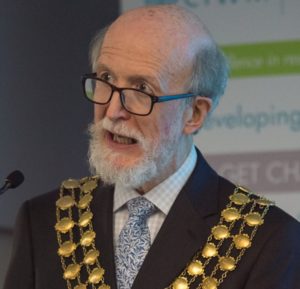
DCW gives his final speech as CIWM President
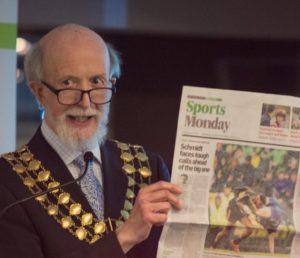
The Gaelic Football team which Enda Kiernan manages appeared in the lead photo story of the previous day’s Irish Times
Professor David C Wilson handed over the Presidency of CIWM, the UK and Irish professional body for resources and waste, to Enda Kiernan at the Aviva Stadium in Dublin on 13 November 2018. He highlighted plastics – both plastics entering the oceans and China’s ban on imports for recycling – as the dominant topic in his Presidential year. The public focus on marine plastics also helped dissemination of his Presidential report, the CIWM-Wasteaid Toolkit Making Waste Work; the website clocked 56,000 visits in its first year, with 7,000 downloads. DCW introduced his fellow Irishman, Enda Kiernan of Cork County Council as the next President. CIWM waited more than a century for its first Irish President; now we have had three in five years, and two in a row, although Enda is the first from the Republic of Ireland.
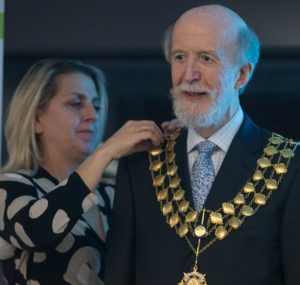
The chain of office is removed from DCW to pass over to Enda Kiernan
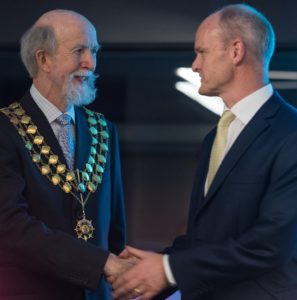
DCW congratulates Enda Kiernan on becoming the 103rd President of CIWM
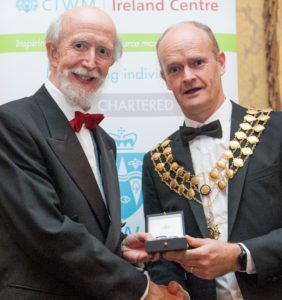
Enda Kiernan presents DCW with his Past President’s medal
14 October, 2018 | Publication, Resource and waste management
According to the UNEP and ISWA’s Global Waste Management Outlook (GWMO), three billion people lack access to basic solid waste management (SWM) services; addressing this global waste crisis would not only vastly improve their lives but also halve the weight of plastics entering the oceans. Professor David C Wilson and Mike Webster of Wasteaid made the case earlier this year, in an open access editorial in the ISWA journal Waste Management & Research, for community waste management as a ‘bottom up’ approach, to run in parallel to traditional ‘top-down’ approaches led by donors and governments.
Community waste management aims to help local communities in the poorest countries, where the local authority often has no funds to provide a SWM service, to tackle the problem themselves through the resource value in the wastes. If, for example, food wastes or low-value plastics are kept separate, they can be turned into new, useful products. With simple tools and the right knowledge, people can become self-employed recycling entrepreneurs, providing a very valuable service for the health and wellbeing of their community, and the whole planet – as well as reducing poverty and creating sustainable livelihoods.
One of the gaps identified by the GWMO was for practical guidance on such low-cost ‘waste to wealth’ technologies which involve minimal capital investment and make products to sell in a local market. DCW’s CIWM Presidential Report aimed to plug that gap: Wasteaid prepared a Toolkit, including a dozen How-to-do-it Guides for simple technologies using organics and low-value plastics.
While preparing the Toolkit, we identified a parallel requirement, for the scientific underpinning of some of the technologies. This month sees the publication of a paper on optimising the technology for producing plastic bonded sand blocks, for use e.g. as paving slabs, from the low value LDPE film plastic, which is a major problem even in the least-developed countries. Our team at Imperial College London was led by Professor Chris Cheeseman, with the laboratory research carried out by Alexander Kumi-Larbi Jnr and Danladi Yunana. The technology was developed by another co-authors, Pierre Kamsouloum, a self-taught entrepreneur from the Cameroun.




